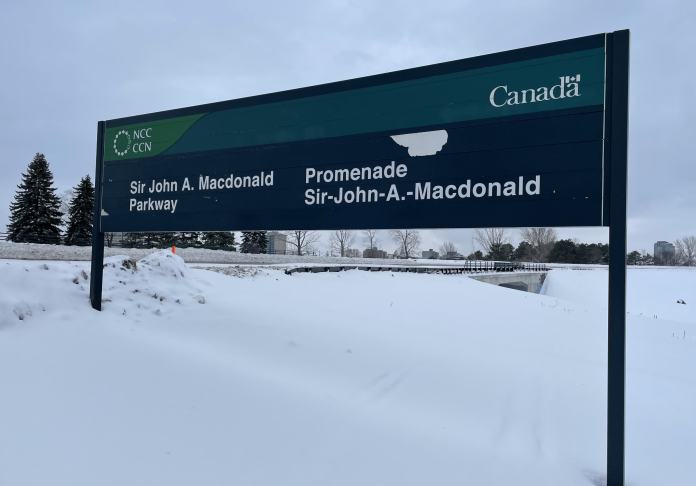By Charlie Senack
The Sir John A. Macdonald (SJAM) parkway will soon bear an Indigenous name after years of community push and debate.
The National Capital Commission (NCC) said during a Jan. 19 board meeting that the name will be chosen and voted on by June. It will be announced during a Truth and Reconciliation Day ceremony at the site on Sept. 30.
It’s the third name in over a decade for the popular four-lane thoroughfare.
Formerly called the Ottawa River Parkway, it was renamed after Canada’s first prime minister in 2012 during the Harper government, as an effort to “reflect” more of Canada’s history.
Public outcry started soon after, and increased in recent years after the horrors of Canada’s former Indian residential school system came to light. It is estimated that more than 4,000 Indigenous children in these schools died or went missing. Macdonald has been considered the main architect behind the system.
In summer 2021, a ground-penetrating radar located over 200 unmarked graves at a former residential school site in British Columbia. Then three Ottawa city councillors wrote Prime Minister Justin Trudeau to request the renaming of the SJAM parkway.
During the second annual Truth and Reconciliation Day on Sept. 30, 2021, hundreds wore orange shirts and marched the parkway demanding its name be changed.
Albert Dumont, the English-language poet laureate for Ottawa, and others, wanted it renamed the Kichi Sibi Parkway, after the Anishinaabe word for “great river.” In 2021, the winter trail that parallels the parkway adopted that name after consultation with the community.
Ottawa Mayor Mark Sutcliffe, who was part of the original campaign to rename the parkway after Macdonald, has said he was “misinformed” at the time. He added that he is glad it will receive a new Indigenous name.
“I’m fully supportive of this motion and glad to see it happening,” he told the NCC board. “I think this is something that Canadians and residents of Ottawa can be proud of once this process is complete.”
Norm Odjick, an NCC board member from Algonquin Anishinabe Nation Tribal Council, said the name change is an important step toward reconciliation.
“(It’s) a very important area for the Algonquin people. The Ottawa River, and the other waterways nearby, that was our highways — one of the main ways we’d get together to gather and trade,” he said.
